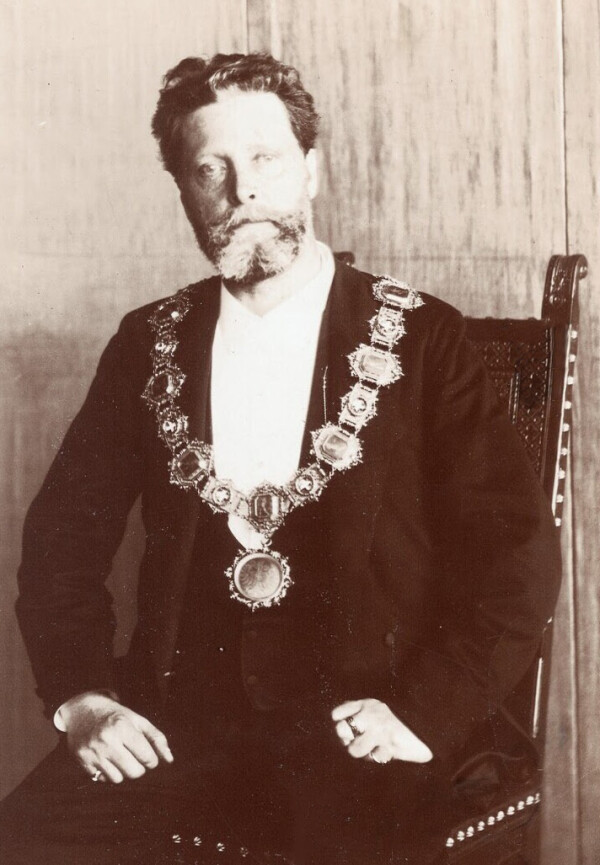Karl Lueger

Karl Lueger photographed by Johann Victor Krämer, around 1900
© The ALBERTINA Museum, Vienna

Karl Lueger in the "Südlicher Rauchersalon", Vienna City Hall, around 1907, Wien Museum
© Wien Museum
The former mayor of Vienna Karl Lueger is today considered one of the first modern, populist local politicians. Already at the turn of the century, he made targeted and opportunistic use of anti-Semitic and German National polemics, integrating them into his political program and exploiting them for financial gain.
Karl Lueger was born on 24 October 1844 in Vienna, the son of an usher at Vienna’s Technical University. Despite his family’s low social standing, he attended the prestigious private school Theresianische Akademie, and from 1862 studied law at Vienna University. Having graduated with a doctoral degree in 1870, he passed the bar examination and founded his own law office, which he ran until 1896.
Lueger took an interest in politics early on. Opposing the liberal municipal government, he became a member of the Vienna City Council in 1875/76 and advocated universal voting rights independent of incomes. This proposal was adopted as part of the 1885 electoral reform, thus facilitating Lueger’s political advancement. By means of anti-Semitic slogans, social agendas and a focus on German National and Christian values, he managed to mobilize the disquieted masses and founded the Christlichsoziale Partei [now ÖVP, Austrian People’s Party].
Winning the Office of Mayor through Anti-Semitism
From 1893 to 1895, Lueger acted as city councilor and harbored ambitions to become mayor. By 1895, his party had become so strong that he was indeed elected mayor. But he also met with resistance. Owing to his inflammatory slogans against Jews and Hungarians, and his disregard for government bodies, he initially only acted as vice-mayor. Only after five election reruns, and against the wishes of Emperor Franz Joseph I, was he officially confirmed as mayor of Vienna on 20 April 1897.
That Lueger owed his political power to deliberate baiting of the Jewish population did not pass without comment in literary circles. In 1910, the writer Felix Salten criticized Lueger for having made anti-Semitism socially acceptable:
“Pointing the general discontent into the direction of the Jewish ghettos; there, it may run riot. A thunderstorm must clear the depraved air of Vienna. He lets the storm erupt over the Jews. And everyone else can breathe easily again.”
Salten’s close friend Arthur Schnitzler, too, addressed the Viennese population’s hatred against Jews, which Lueger deliberately stoked, in his plays Professor Bernhardi and Der Weg ins Freie.

Unveiling of the Lueger monument in the Lainz care home, September 8, 1906, Wien Museum
© Wien Museum
Lueger’s Work for the City of Vienna
Despite his highly questionable political tactics, numerous social reforms and projects, which are still in place today, go back to Karl Lueger’s government.
During his 13 years in office, he effected the communalization of the City of Vienna’s most important supply posts in an effort to curb monopolization. Along with the municipalization of power stations and tramway operations, he initiated the city’s expansion beyond the Danube.
Sociopolitical innovations included the founding of an unemployment office, a central council for welfare, a municipal orphanage and an almshouse in Lainz. The school system was extended, and the entertainment venues Kaiser-Jubiläums-Theater (now Volksoper) and Urania were built. Further reforms included the expansion of Vienna Central Cemetery and the establishment of a funeral home for the poor.

Karl Lueger, detail from Gustav Klimt: Auditorium in the old Burgtheater, 1888, Wien Museum
© Wien Museum

Funeral of Mayor Dr. Karl Lueger on the Ring, March 14, 1910, Wien Museum
© Wien Museum
Gustav Klimt Overlooks Karl Lueger
In 1888, Gustav Klimt and Franz Matsch were commissioned by the City of Vienna to capture the auditorium of the old Burgtheater prior to its demolition. Featuring 133 detailed miniature portraits, Klimt’s watercolor provides a comprehensive overview of the most important people of Viennese society. Klimt’s brother Georg recalled in an anecdote in 1929 that the artist had almost made a social faux pas with his painting Auditorium of the Old Burgtheater (1888, Wien Museum):
“People are familiar with the painting from exhibitions, and we all know that it captures Vienna’s most famous personalities of the time in faithful likenesses. Klimt even included himself and his brother Ernst in the theater’s pit. But when the painting was already finished, a big mistake was discovered – someone was missing, someone whom Klimt had overlooked: Lueger.”
That Gustav Klimt was asked to add the portrait of the popular politician to the already finished work highlights the importance of Karl Lueger for Viennese politics at the time. Georg Klimt recollected:
“The councilman who noticed the oversight declared: ‘Lueger must be included, otherwise it will be difficult budget-wise.’ And so Klimt had to look for a place in the theater’s pit for the mayor of Vienna [NB: When the painting was completed in 1888, Lueger was not yet mayor but city councilor.] And so the painting could be acquired for the municipal collections.”
Karl Lueger died on 10 March 1910. His last resting place is at a crypt designed by Max Hegele at St. Charles Borromeo Cemetery Church [now Lueger Memorial Church] at Vienna Central Cemetery.
Literature and sources
- Wien Geschichte Wiki. Karl Lueger. www.geschichtewiki.wien.gv.at/Karl_Lueger (03/31/2020).
- Sueddeutsche Zeitung. www.sueddeutsche.de/kultur/wiener-moderne-wie-gustav-klimt-mit-dem-rechtspopulismus-seiner-zeit-umging-1.3848120 (03/31/2020).
- Österreichische Biographisches Lexikon. Karl Lueger. www.biographien.ac.at/oebl/oebl_L/Lueger_Karl_1844_1910.xml (03/31/2020).
- Die Welt der Habsburger. Sag’ zum Abschied leise Servus: Der Umzug des alten Burgtheaters ins neue Haus am Ring. www.habsburger.net/de/kapitel/sag-zum-abschied-leise-servus-der-umzug-des-alten-burgtheaters-ins-neue-haus-am-ring (03/31/2020).
- Rainer Metzger: Lueger, Wagner, Wien um 1900 (26.05.2010). www.artmagazine.cc/content48093.html (03/31/2020).
- Leopold Wolfgang Rochowanski: Intimes von Klimt, in: Neues Wiener Journal, 13.01.1929, S. 19.
- Felix Salten: Lueger, in: Das österreichische Antlitz. Essays, Berlin 1910, S. 127-142.
- Christfried Tögel, Liselotte Pouh: Ein neuentdeckter Brief Sigmund Freuds. Ein neuentdeckter Brief Sigmund Freuds. www.freud-biographik.de/salten.htm (11/25/2021).
- Felix Salten: Erinnerung an Lueger. Lueger-Denkmal, in: Neue Freie Presse, 19.09.1926.

